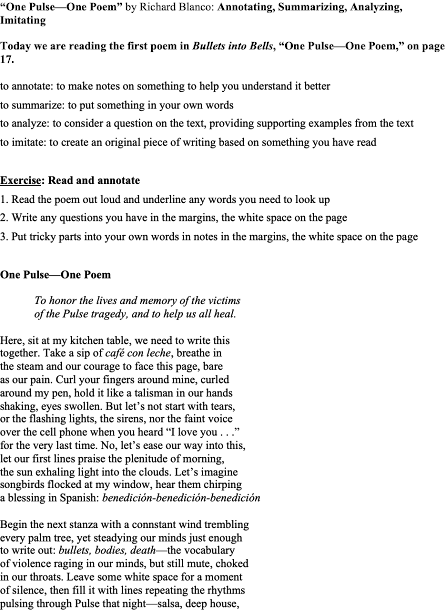Week 23: College Reading and Writing: Joel Dias-Porter and Kiki Leyba
handout by Prof. Kate Glavin, running the weekly classes in South Bay for the summer; thanks, Kate!
Week 23:
College Reading and Writing: Joel Dias-Porter and Kiki Leyba
Joel Dias-Porter
and Kiki Leyba: Annotating, Summarizing, Analyzing, Imitating
to annotate: to make notes on something to help you
understand it better
to summarize: to put something in your own words
to analyze: to consider a question on the text, providing
supporting examples from the text
to imitate: to create an original piece of writing based on
something you have read
We are doing the tenth poem and response in the book today,
starting on page 33.
Exercise: Read and annotate
1. Read the poem and response out loud and underline any
words you need to look up
2. Write any questions you have in the margins or in your
notebook
3. Put tricky parts into your own words in notes in the margins
or in your notebook
Exercise: Questions for Comprehension of the poem
1. How do you
feel about how Dias-Porter uses questions in the poem? What do you feel is
their significance?
2. What is
Keisha’s role in the poem? What does she mean when she says she’s “been ran out
of tears”?
3. Why does the speaker feel that the nature
poems no longer resonate?
Exercise: Summarize the poem
Write a
paragraph summarizing the poem with quotations, in-text citation, and a Work
Cited Page.
example too-short summary from last week,
incorporating quotation and in-text citation:
Kyle
Dargan’s poem “Natural Causes” tells the story of a boy who purchases a gun
“from a farm in Virginia” (31) from a farmer who “keeps his gaze down as to
remember nothing of the boy’s face” (31). The speaker of the poem insinuates
that the farmer has sold guns to other boys like this one, when they say, “His
customers rarely return older” (31).
Work Cited Page (for
today’s poem)
Dias-Porter, Joel. “Wednesday Poem.” Bullets Into Bells: Poets and Citizens
Respond to Gun Violence. Ed. Brian Clements et al. Beacon Press, 2017.
Exercise: Questions for Comprehension of the response
- How is this a response to Dias-Porter’s poem? What is it
responding to?
- Who is the “you” in the first line?
- What does Leyba mean when she says “The darkest days grow
strength/ in ways I don’t want to speak of”?
Exercise: Summarize the response
Write a
paragraph summarizing the response with quotations, in-text citation, and a
Work Cited Page.
Exercise: Analysis
Question for
analysis: In Dias-Porter’s poem, the speaker puts his nature book away because
“which student could these pistils protect, here where it’s natural to never
see seventeen.” In contrast, Leyba uses the word “unnatural” to describe the
horrors of gun violence. Write an analysis where you answer what “natural” and
“unnatural’ are doing in each piece and what is being described as “natural”
and “unnatural.”
Exercise: Imitation
Write a contrast poem where you compare something you
consider “natural” to something you feel is not.
Homework:
- Summary of
Poem
- Summary of
Response
- Analysis of
Poem and Response
- Imitation of
Poem
About this class:
In this class, you are welcome to
submit homework for a grade. If it’s not
strong enough to earn an A, I’ll give you some comments to help you revise it,
and let you do it over again. You have as many chances as you want to complete
and perfect the work in this class, and you are welcome to do more than one
week’s worksheet for homework at a time; ask me for sheets you’ve missed. Students who complete 15 weeks of graded assignments
and a longer paper can qualify for college credit. When you get close to completing 15 weeks,
I’ll help you get started on your longer paper.


Comments
Post a Comment